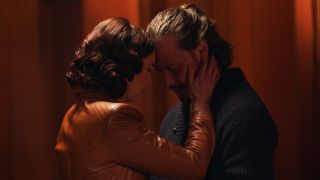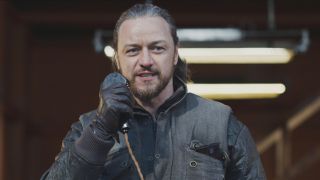His Dark Materials' Executive Producer Explains The Finale's Key Change From The Book, The Final Battle, And What Season 3 Skipped
His Dark Materials EP Jane Tranter opened up about the final episodes.
Warning: MAJOR SPOILERS AHEAD for the final two episodes of His Dark Materials on HBO, called “The Clouded Mountain” and “The Botanic Garden.”
The three-season saga of His Dark Materials has come to an end with a pair of episodes that not only killed off two important characters, but separated the main pairing and sealed off their worlds forever. Stars Dafne Keen (Lyra) and Amir Wilson (Will) shared their reactions to what Keen described as their characters' “heartbreaking” ending, and Asriel’s relationship with Mrs. Coulter turned out to be even more complicated than the actors previewed. Executive producer Jane Tranter spoke with CinemaBlend about the final two episodes, and explained an emotional change from Phillip Pullman’s The Amber Spyglass, all the work that went into the final battle, and the story that viewers never got to see.
There is a lot to absorb after these final episodes, so read on for what EP Jane Tranter had to say about what happened!

Bringing The Final Battle From Page To Screen
The action climax of the whole series actually happened in the penultimate episode, following the epic battle between Asriel’s forces and those commanded by Metatron. The action was also over by the end of the penultimate episode, and Lyra and Will had already accidentally killed the Authority with an hour still left in the series. The emotional climax of His Dark Materials happened “The Botanic Garden." Asriel and Mrs. Coulter were dead by the end of Episode 7, and Lyra had fallen as Eve and then been split from Will forever by the end of Episode 8. All in all, a pretty intense way to say goodbye to a saga!
A lot was similar to the book – with much of Lyra’s speech to Will lifted directly from the pages of The Amber Spyglass – but an epic battle as written on the page isn’t easy to recreate on screen, just like how the mulefa had to be changed from page to screen. In fact, the show cut two elements from The Amber Spyglass that I’d originally put on a list of book moments that needed to be adapted for the show. The finished product worked for television, however, and EP Jane Tranter opened up about the process of picking and choosing what to bring to the final battle. She said:
In terms of the actual choreography of the physical battle, that was really the genius of Russell Dodgson. We knew all of the story beats that we had to hit, so we knew that we'll have this amazing, spectacular, and splendid battle. But actually, as Stelmaria makes the point to Asriel, it's a good thing that they don't have to win it. Asriel's acting as the biggest decoy he possibly can, in order to be able to distract from the discovery of the daemons, and Will and Lyra cutting through from the land of the dead, so Metatron can't sense when the blade goes through, because Asriel is making this huge noise and distracting everyone.
Jane Tranter credited senior visual effects supervisor Russell Dodgson (who also directed the action sequences for “The Clouded Mountain”) with choreographing the battle, which was no small task. There were important story and character moments that the show needed to hit for the war that was more or less promised at the end of Season 2. That said, Asriel making noise and serving as a decoy also meant that there had to be a whole lot of action happening if it was going to be believable that Lyra and Will were able to live long enough to reunite with their daemons. Tranter went on to describe the challenges of striking a balance, saying:
There are various things with the characters in the air and in the different places. You've got Asriel in the air, you've got Serafina Pekkala in the air, you've got Serafina Pekkala's daemon in the air, you've got Mrs. Coulter on the ground, you've got Xaphania on the ground, you've got Commander Ogunwe on the ground, you've got all the troops on the ground, you've got the arrival of the spectres, you've got the arrivals of the cliff-ghasts, and we had to sort of balance all of these different elements to make them work narratively, so we could get first the daemons and then Will and Lyra to the tower in order to be able to bring on the denouement in the end.
The battle couldn’t just be action for the sake of action or fighting for the sake of fighting; everything had to serve that story that still had to continue for the finale that would tear Will and Lyra apart, after the war had been won. So, the show made a key change from the book to give Lyra a special character moment, and establish some of what was on her mind about her parents in the finale. The executive producer explained the change when it came to Lyra finding out about her mother’s death:
CINEMABLEND NEWSLETTER
Your Daily Blend of Entertainment News
[Then] Lyra and the golden monkey are in the same place at the same time for us to be able to do something, which is a change from the novel, which is having one moment of sense of love and forgiveness, really, from Lyra's part to her mother, just as she sees the golden monkey for the last time, which I think is a brilliant new moment. It was a complicated chessboard to move the pieces around at the same time as having an incredible battle with angels, witches, and intention craft fighting angels. We just endlessly toned our way through it and kind of worked out, 'Alright, what should everyone be doing?'
As if Lyra wasn’t already heartbroken enough by “The Clouded Mountain” (and headed for even more heartbreak by the end of “The Botanic Garden”), she had a moment of caring and reaching out to the golden monkey daemon who had once attacked Pan, only to see him fade away into dust as a sign that her mother was dead. Lyra never found out that her parents died sacrificing themselves to eternal oblivion to save her, but the change to the book let Lyra know that her mother had died, and the moment with the monkey showed that she has grown up a great deal.
Lyra would even mention that she should be relieved that her mother was dead, and that might have even been the case earlier in the series, but not anymore. Believing that Asriel was gone as well, she also admitted that she didn’t hate her father anymore, although she couldn’t forgive him. The action sequence set up the teens’ surprisingly adult emotional breakthroughs of the final episode, and possibly sent viewers everywhere reaching for tissues by the time that Lyra and Will were visiting their bench in their own worlds, once every single year.

What Fans Didn’t See From The Missing Extra Episode
As it turns out, the swan song for Mrs. Coulter and Asriel to set up Lyra being free to fall in the finale could have had very different context if the full story had been told as intended. The seven-episode second season was originally intended to run for eight, with an Asriel standalone episode that would have filled in the blanks for what he was doing between the end of Season 1 and when he suddenly popped up again at the end of Season 2, before appearing in most episodes of Season 3.
The Asriel standalone story had to be scrapped because of COVID production shutdowns and was never filmed, although it was written. When I spoke with Jane Tranter about His Dark Materials, I asked if any elements of that episode were folded into Season 3, and she shared:
There weren't any direct elements because the standalone episode took place in the tower in Cittàgazze and it really tracked and followed Asriel's journey from when he had crossed through the tower in the sky at the end of Season 1. We were really interested in the idea that the journey that we see Lyra do at the beginning of Season 2, we would later see in flashback see Asriel do the same journey but with sort of different outcomes and to see why Cittàgazze had been emptied of all its population.
Asriel had enough of a head start on Lyra between Seasons 1 and 2 that Cittàgazze was empty of almost all functioning adults by the time she arrived, with no reveal of what exactly had happened other than that the spectres had arrived. The Asriel standalone episode would have filled in those blanks. If his actions had been despicable to the people of the city, or heroic, might we have seen him differently by the time he was finally showing that he cared for Mrs. Coulter and Lyra?
That’s not to say that the show just abandoned any kind of transition between Asriel’s one scene in Season 2 and leading armies from multiple worlds to war in Season 3, of course. Jane Tranter continued:
What we did end up having to do as a result of that missing episode, which really laid out quite a lot of Asriel's vision for what he wanted to achieve with his Republic and what the point and purpose of everything he was doing was, we then had to reorganize a little of what we were going to do at the beginning of Season 3, in order to still be able to get that across to an audience given we've lost that from Season 2.
While viewers didn’t get an hour-long episode to follow Asriel’s journey to show how he got to the point of his grand speech at the end of the Season 2 finale, Season 3 did include some exposition from Asriel. His Dark Materials didn’t have time to show, but it made the time to tell. The executive producer explained how they reorganized the story to make it work:
That really resulted in the change in terms of seeing Asriel recruit Ogunwe, and having Ogunwe be able to ask Asriel questions like us as an audience member asking like, you know, 'What are you talking about? And what war? What kingdom of heaven? What do you mean?' [That] kind of thing. And so we change that in order to be able to lay out right from the start what Asriel's declaration of intent is throughout his journey on the third season and where the stakes are for him. So it wasn't anything directly but there was a direct consequence and sort of a good one. I think it was works well having Asriel recruit Ogunwe and being able to see Ogunwe's journey into the camp.
It’s a shame that the standalone Asriel episode couldn’t be produced, but the exposition did serve to strengthen the on-screen relationship between Asriel and Ogunwe, which paid off as the season continued. Plus, unlike Asriel, Ogunwe survived and reunited with his daughters while Asriel is doomed to eternal oblivion with Mrs. Coulter and Metatron.
So, is this the end of His Dark Materials? Just like The Amber Spyglass, the series finale didn’t end in a way that left hope for Will and Lyra to ever see each other again before they pass through the land of the dead, but did set them up to live full lives in their own worlds, and their decision to let each other go saved the multiverse. Of course, the show did end with the tease that Lyra and Pan have more adventures in store, and Phlip Pullman does have a second novel trilogy featuring Lyra. Perhaps more of her journey will come to the small screen someday!
For now, you can always revisit the three seasons of His Dark Materials streaming with an HBO Max subscription. If you’re anything like me after watching that finale and have not yet recovered, you may want to start with one of the more lighthearted episodes and ignore that foreshadowing from Season 2 about the bench! You can also start planning ahead for the new year with our 2023 TV premiere schedule.

Laura turned a lifelong love of television into a valid reason to write and think about TV on a daily basis. She's not a doctor, lawyer, or detective, but watches a lot of them in primetime. CinemaBlend's resident expert and interviewer for One Chicago, the galaxy far, far away, and a variety of other primetime television. Will not time travel and can cite multiple TV shows to explain why. She does, however, want to believe that she can sneak references to The X-Files into daily conversation (and author bios).
Most Popular





